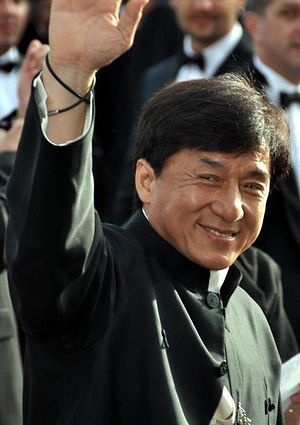Chinese police have arrested the son of famed Hong Kong movie star Jackie Chan on drug charges.
According to the Associated Press, Beijing police announced on their microblog on Monday night that they had detained Jaycee Chan along with Kai Ko, a 23-year-old Taiwanese movie star, for possession of marijuana. The two were detained together by police last Thursday, the report said, noting that the Beijing police had not said why their arrest had not been announced until Monday night.
The police report did say that 100 grams of marijuana had been seized from Chan’s home. It also said that both actors had subsequently tested positive for marijuana. China’s national television said that Chan is being charged with “accommodating drug users” while Ko is being charged with drug consumption. Somewhat ironically, accommodating drug users is a harsher charge than drug consumption in China, and it carries a maximum sentence of three years in prison. Two other individuals also detained with the celebrities are being charged with selling drugs.
Chan’s management company, M’Stones International, released a statement apologizing for his arrest and pledging to “supervise his rehabilitation and help him return to the right path.”
The arrests come amid the Chinese government’s ongoing crackdown on drugs. As Shannon previously noted on China Power, Chinese President Xi Jinping recently called for “forceful measures to wipe [drugs] out,” while Premier Li Keqiang called drugs a “common enemy to humanity.” As Shannon also noted in that report: “China’s police seem especially keen on catching Chinese celebrities who use drugs, allowing them to send high-profile warnings to others.”
Indeed, the AP report about Chan’s arrest quotes an “anti-drug advisor for the Beijing government” as saying that the government had decided to target celebrities because “these people have a large number of fans, so their behavior tends to have a huge influence on young people.”
According to his biography on IMDB, Jaycee Chan is an “actor, singer, composer, lyricist, and guitarist. He also plays the piano, drums, and bass guitar. He released his first, self-titled, CD, ‘Jaycee’ on September 15, 2004. This CD, for which he composed the music and wrote the lyrics for 10 of the 13 tracks, earned him many music awards in Asia for Best New Male Singer.” It also notes he has starred in a number of movies, including The Drummer and 2 Young.
The arrest, however, is somewhat surprising given that Jaycee’s father, Jackie Chan, has frequently been a fierce and public supporter of the Chinese government and Communist Party. Buzz Feed has a collection of some of the elder Chan’s controversial comments in support of the CCP. For example, on the issues of human rights and democracy, Jackie Chan once said: “With too much freedom, we become like Hong Kong and Taiwan– such huge messes” and “I’m beginning to think that we Chinese people need to be controlled.”
He has also taken to Weibo on a number of occasions to deny that China has an air pollution problem, which has made him the target of unrelenting (and quite vulgar) attacks from Chinese netizens.
In this context, it’s worth noting that President Xi recently vowed that no official no matter how powerful would be spared in his anti-corruption campaign. The targeting of high-profile celebrities– and especially the son of such a strong supporter of the CCP– might also be an attempt by China’s leadership to demonstrate that no one is above the law. Indeed, Chinese national TV reportedly featured a segment showing the police raid on Chan’s house.
On the other hand, the AP notes that China made Jackie Chan an anti-drug ambassador back in 2009, and that Kai Ko had also been a part of an anti-drug campaign.

































